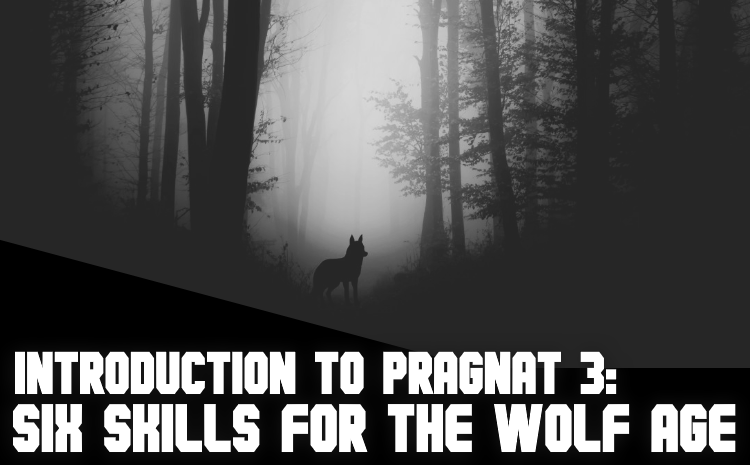I’ll be honest with you. I don’t care about your reload time or the gear you run. I don’t care what stickers are on your gun case—or if you even have one. What I do care about is your ability to find and clean water in a crisis. That matters; it’s the basis of life.
Once you have a temporary buffer (food, fire, shelter, water) of a few months, you really want to start to develop the skills to keep them. You might even want to develop them to the point you can expertly produce these essentials so you can become a valued member of your community. You want to hone those skills so you can provide these essentials barefoot in the snow or in the desert. You want to master your environment with knowledge, practical skills and experience. Climb the mountain towards ascended Aryan status and basic Faustian beliefs.
Essentially, you wish to be spiritually White like our pioneering ancestors; they could brave the new world because they themselves were forged to do so. Our brave new world resembles Huxley’s dystopian interpretation of it, so we had best be armed with the skills to navigate it. I have my own interpretation of what skills will help you through these trials and have listed them in no particular order.
- Water purification, distillation, filtering, chemical treating.
- Basic electrical, re-starting 220, hooking up generators, solar, inverters.
- Basic vehicle maintenance, jump starting, servicing, advanced operating and recovery.
- Basic life saving techniques, like resuscitation and first aid.
- Communication
- Navigation
Water is the basis of all life. Because of this, it can be found everywhere, including in the air we breathe. While evaporative technology does exist that can farm moisture from the air, water can easily be found elsewhere.
A running vehicle with the air-conditioner on charges the battery and lets you use electrical communication equipment and stay cool in the shade. However, to the enlightened the condenser is dripping water beneath the vehicle. Collect the water where it drips to treat, filter, and distil it as required.
While the water may have been shut off in an area, the cistern atop all flushing toilets is probably filled with water waiting for its next flush. Who would have considered it a resource? If the water is out but my neighbour has a pool (so google maps shows me) a rope on a bucket allows me to source it freely to distil or use for any purpose. If you are serious about staying alive no matter what, you want to secure that liquid life force in any environment reliably.
This may mean keeping Life Straws in your vehicle, a Berkey filter at home and a still of some sort. It may also mean you develop plans to flush toilets in extended periods of unrest or to abandon unnecessary water based systems altogether. It really is incredible we choose to do such things as flush toilets with fresh water. How very Roman of us all!
Electricity has become another essential life force, whether we like it or not. Many basic systems of life support are reliant on it. In winter, your hydroponic garden may require it or your communications equipment may be a paperweight without it. Understanding the basics like circuit breakers, what causes them to trip, and how to reset a tripped circuit or blown fuse is paramount. Diagnosing faults with electrical equipment may be critical. Being able to plug in and start a generator to run a fridge or freezer in your home could be the difference between life and crippling hunger—or death—in the future. Learning basic solar panel function, vehicle electrical skills, and other DC 12V power skills are also beneficial if you wish to use them in long term survival situations.
For instance, you can use a small air still from a 12V car battery with a solar blanket to produce clean drinking water in a crisis quietly and efficiently. These abilities often interlink and mesh with overarching security and survival plans.
The basics can be learnt from any good guide. Practical experience can be gained by doing some work with an electrician, perhaps in an exchange for tools, cash and experience. Trade schools allow some level of training online and some study may be subsidised since it is a high demand trade. Seriously consider it and how important it is to a community and yourself as an individual.
Basic vehicle maintenance is another pioneering skill of old which is largely lost today. Being able to change, patch or install a tube in a tire is essential. Using the vehicles weight to break a bead on the rim was once common knowledge. Sadly, this is not the case anymore.
A vehicle is a mobile house, regardless of size, so it should be able to accommodate you comfortably, keep you dry, and allow you to sleep securely and store enough food and water for mid-term survival. It should also be a communications center allowing contact with the outside world.
It should also be capable to jump start your (or another persons) vehicle with jumper cables or a portable battery pack. A portable battery pack is inexpensive and can also be used as a second battery to silently charge phones and devices locked in your vehicle with the engine off.
Also, you should have basic recovery tools such as a strap for towing or moving a vehicle. Heavy straps can also be used to remove a bollard or security screen. Vehicles can also store spanners, sockets, spare spark plugs, water dispersant, spare fluids, gasoline, and oil.
Within a survival vehicle, you can use and store all manner of useful items, tools, and resources. The possibilities are enough to fill a dozen articles; I may write such articles in the future. Your vehicle is essentially a one-person caravan. Properly and wisely equipped, it might be the springboard from which a new multi-generation white colony is built. Treat it with respect. It is also the most likely place you will have interactions with law enforcement. Be sure it sends the messages that you want it to.
Basic life saving isn’t first aid as it is commonly presented. I’m not concerned about the stubbed toe, I am concerned about the ingrown toenail that festers and goes septic, immobilising you in the field. Having to set a broken bone is also important. It’s easy enough to keep a plaster bandage for broken bones. However, anatomical experience to be able to feel through swelling is necessary for proper treatment and healing. Hospitals may not be an option in the future. Plan and prepare accordingly. Going to a hospital and presenting with severe and suspicious wounds may alert the enemy state.
Bare minimum, I would advise a NAEMT run TECC course. If you can not attend in person, then purchase a copy of their Second Edition Manual. It comes with online log-in that lets you study the course, have the resource book for further reference, and even receive a nice accreditation. Of course, you can sign up with an alias if you wish. Perhaps you can attend such training under the proviso of providing humanitarian aid and assistance. Some courses are even subsidised. Maybe a potable water training course with TECC training allows you to do a clean water project in Africa. You may even get the updated UN B-Safe accreditation, which when stopped travelling to some places opens doors. Sure, you are a military aged man in good condition but your resume and supporting documentation instantly makes you the good guy. What border guard argues with the UN anymore?
Communication is a vast field. It can be HUMINT. It can mean being able to speak with people freely. Or, it can be passive and allow the absorption of information clandestinely, aiding your adaptation to a situation. It could be giving a message to the other side you wish for them to understand. It could encompass the equipment, technology and methods and certainly could also include such fields as deductive reasoning.
Are you going to master all of these in a year? Probably not. Still, look at what you can achieve. If you are in a vehicle, look at installing a CB and learning how truckers interact. What messages do they share? How is it of use and how might it be of use? Can I interact with one and garner knowledge easily? Can I passively monitor it and learn what is occurring around me? Is there a comms plan for my region? Is there a GMRS repeater nearby? What can I learn from listening in and interacting with this network?
Can I learn HAM radio and integrate it into my plan? APRS does let you send a SMS message to a cell phone from a radio innawoods, so that could be advantageous to you under some circumstances. It’s a Faustian field and one we should always stay current on, no matter our level or ability.
Lastly is Navigation, another broad and wonderful field. Celestial navigation may be essential in an escape and evasion scenario. Using your watch face as a compass accurate to 3 degrees may also be handy during the day. So is using the North Star at night as a compass. Above all, map to ground should be a core skill of every man; being able to see a land he has never seen by simply glancing at paper or digital screen will help you plan and conquer accordingly. Reliance on GPS / Glonass has become standard with our soldiers and police. It is to the point they are combat ineffective without such technology. A simple ball compass in the cab of your vehicle will allow you track your location, add it into a map, maybe draw a lineal map and take a road trip. Perhaps start to use open-source navigation tools like Google Maps on a browser, plot dates and times, and learn traffic patterns. You can even use the street-view option and go back a decade in time to see what something used to look like. These skills may be valuable in the near future.
Clearly these 6 skills interlink, as core skills often do. While there is a lot of information, I have barely scratched the surface. Expertise in any of these skills takes a lifetime, but your proficiency starts today. Start with something you have an interest in. Start with something you already have some solid knowledge about and then slowly branch out. While not as glamorous or romanticized as things such as survival hunting, these are the core skills that the others are absolutely dependent on. For example, the hunter has little chance of ferrying out his harvest if he can not navigate back to his vehicle.
May you slowly become the hunter, and not the prey.

